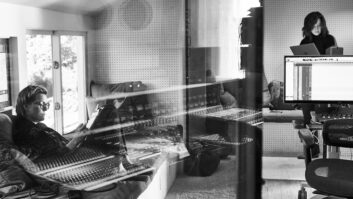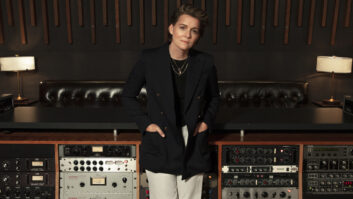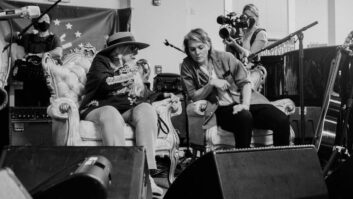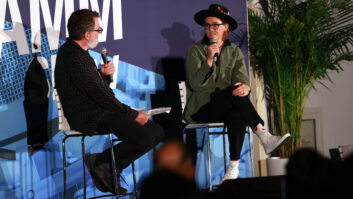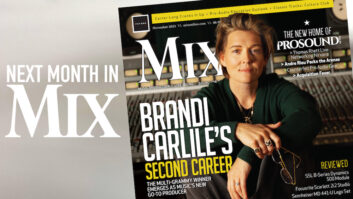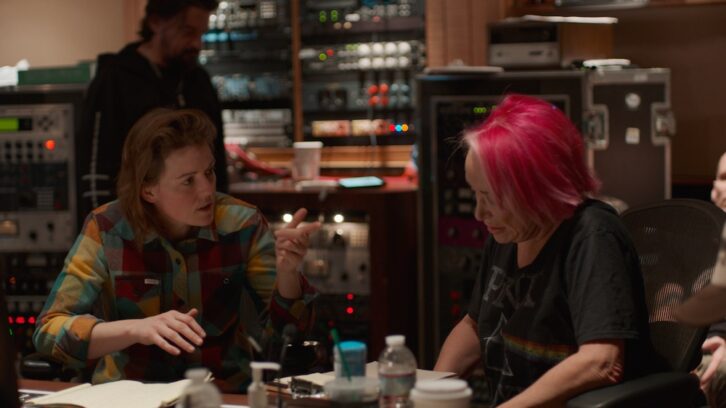
In Part 1 of our interview, Carlile spoke about some of the great producers she’s worked with and how she found herself drawn to that calling. Now in Part 2, she shares her thoughts for how to draw the best performances out of an artist.
With artists you’re producing, how does technology serve your process?
I’m not a producer who really understands the technology in a profound way, so my approach to making albums is really dependent on my relationship with the engineer, which is really like a partnership. The engineer is having to interpret what I’m saying in these really abstract terms. They’re so beautifully adapted to that.
I really try and keep myself protected from technology and recognize that technology might not be my forte, but it’s a beautiful knowledge and a vast knowledge that people like Brandon Bell and David Spring and Trina Shoemaker have access to, and that’s their superpower that they bring to the session, while my superpower is the psychology around the music and the artist. When you bring those things together, it’s a really powerful combination.
How do you coax artists into letting their guard down and embracing their truest selves, imperfections and all?
I think it’s easy for an artist to trust me because they can see I’m genuinely a fan. I know all their songs, and I’ve got strong feelings and opinions about where I think it’s all going, and I’m really up front about that so that it doesn’t ever feel that somebody gets lured into a production or relationship with me only to find out that I’m really intense. I think it’s better that they know that right off the bat.
I think there’s a really fine line, from a producer’s perspective, between “this artist could be so good, this artist has potential,” and “oh my God, this artist is so great, I want to get involved.” There’s an in-between space between those two concepts that is comfortable for an artist. If it leans too left or too right, I think it gets really uncomfortable.
There are all different reasons that I want to work with an artist, whether it’s admiration or a justice-based way of thinking.
What do you mean when you say “justice-based”?
In the case of Tanya Tucker, maybe that’s a good example. She’s just a fabulous artist, such a recordable, incredible voice that just jumps out of any album and pulls you into her narrative.
She’s one of those voices that you hear and if you didn’t know who she was, and a lot of young people don’t, you immediately want to know— “Oh, my God, what is this woman’s story, what is going on here?” She’s so brilliant; she has that weight of the great outlaw legends, like Cash and Waylon and Merle. She even has their vices, even has their past, you know? But the way we revere those amazing men is so intensely different than the way we revere Tanya Tucker, as country music listeners and as people. We even sing these guys’ songs in church, I’ve literally sung their songs in church, and Tanya Tucker was discarded for her similar behavior back in the day.
I don’t know if that’s why she stopped doing music, but she did stop doing music for nearly 20 years. When Shooter hipped me to the fact that she wanted to make another album and he thought I should be involved with producing it with him, I was immediately on a campaign to help bring Tanya Tucker back into public awareness and to make the point that this is a matriarch of the genre. What’s the difference between Tanya Tucker and Cash? What’s the difference between Tanya Tucker and Merle? I was like a dog with a bone, I just couldn’t leave it alone. It was incredibly satisfying.
That’s one example of why I wanted to work with an artist based on a sense of justice, based on musicality, based on just absolute fangirl fixation.
With artists like Joni Mitchell and Tanya Tucker, you’re bridging that generational gap with new fans, and with new collaborators. Is that important to you?
It is, especially as it pertains to women. I think that women are too often discarded around middle age. Men are, too, but to a lesser degree.
I just think that it’s such a beautiful phase of an artist’s life. Because things change about those vocals—that voice drops down a little bit, the lyrics start to become really profound. They just radiate wisdom and gratitude, and I think it’s the sweet spot—and that’s right when pop culture discards those artists. I absolutely hate it.
I don’t think that it’s because of young people, because when you do shine the light on one of these incredible and worthy artists, young people really respond. They’re not behind the mechanism that puts people out to pasture.
